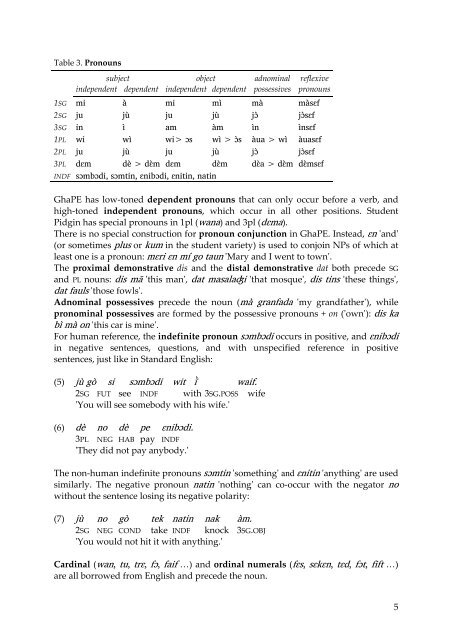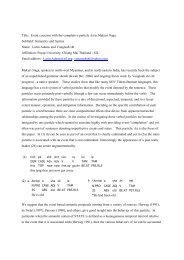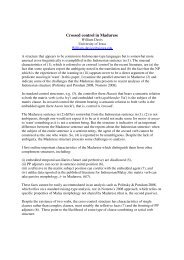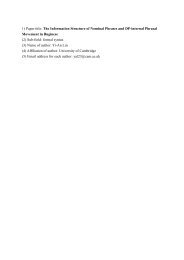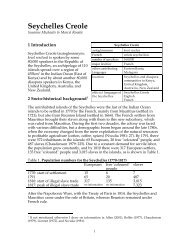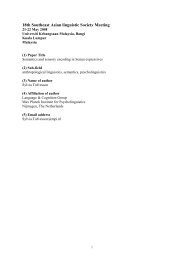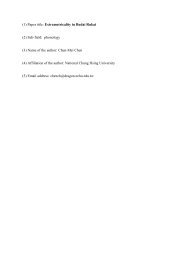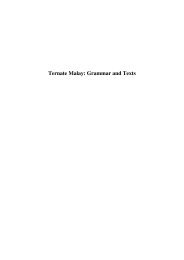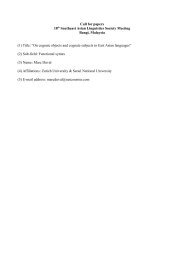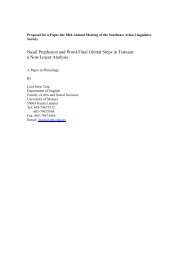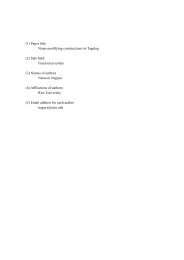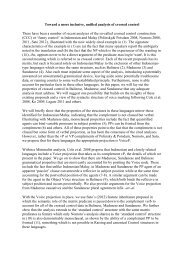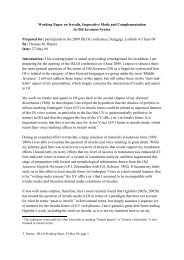Create successful ePaper yourself
Turn your PDF publications into a flip-book with our unique Google optimized e-Paper software.
Table 3. Pronouns<br />
subject object adnominal reflexive<br />
independent dependent independent dependent possessives pronouns<br />
1SG mi à mi mì mà màsɛf<br />
2SG ju jù ju jù jɔ̀ jɔ̀sɛf<br />
3SG in ì am àm ìn ìnsɛf<br />
1PL wi wì wi> ɔs wì > ɔ̀s àua > wì àuasɛf<br />
2PL ju jù ju jù jɔ̀ jɔ̀sɛf<br />
3PL dɛm dè > dɛ̀m dɛm dɛ̀m dɛà > dɛ̀m dɛ̀msɛf<br />
INDF sɔmbɔdi, sɔmtin, ɛnibɔdi, ɛnitin, natin<br />
GhaPE has low‐toned dependent pronouns that can only occur before a verb, and<br />
high‐toned independent pronouns, which occur in all other positions. Student<br />
<strong>Pidgin</strong> has special pronouns in 1pl (wana) and 3pl (dɛma).<br />
There is no special construction for pronoun conjunction in GhaPE. Instead, ɛn ʹandʹ<br />
(or sometimes plus or kum in the student variety) is used to conjoin NPs of which at<br />
least one is a pronoun: mɛri ɛn mí go taun ʹMary and I went to townʹ.<br />
The proximal demonstrative dis and the distal demonstrative dat both precede SG<br />
and PL nouns: dis mã ʹthis manʹ, dat masalaʤi ʹthat mosqueʹ, dis tins ʹthese thingsʹ,<br />
dat fauls ʹthose fowlsʹ.<br />
Adnominal possessives precede the noun (mà granfada ʹmy grandfatherʹ), while<br />
pronominal possessives are formed by the possessive pronouns + on (ʹownʹ): dis ka<br />
bì mà on ʹthis car is mineʹ.<br />
For human reference, the indefinite pronoun sɔmbɔdi occurs in positive, and ɛnibɔdi<br />
in negative sentences, questions, and with unspecified reference in positive<br />
sentences, just like in Standard <strong>English</strong>:<br />
(5) jù gò si sɔmbɔdi wit ĩ̀ waif.<br />
2SG FUT see INDF with 3SG.POSS wife<br />
ʹYou will see somebody with his wife.ʹ<br />
(6) dè no dè pe ɛnibɔdi.<br />
3PL NEG HAB pay INDF<br />
ʹThey did not pay anybody.ʹ<br />
The non‐human indefinite pronouns sɔmtin ʹsomethingʹ and ɛnitin ʹanythingʹ are used<br />
similarly. The negative pronoun natin ʹnothingʹ can co‐occur with the negator no<br />
without the sentence losing its negative polarity:<br />
(7) jù no gò tek natin nak àm.<br />
2SG NEG COND take INDF knock 3SG.OBJ<br />
ʹYou would not hit it with anything.ʹ<br />
Cardinal (wan, tu, trɛ, fɔ, faif …) and ordinal numerals (fɛs, sɛkɛn, tɛd, fɔt, fift …)<br />
are all borrowed from <strong>English</strong> and precede the noun.<br />
5


